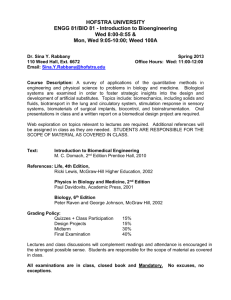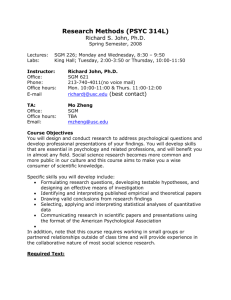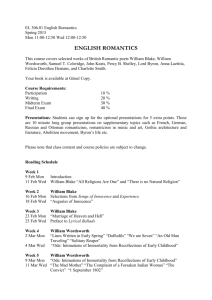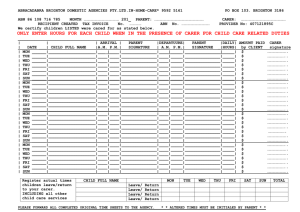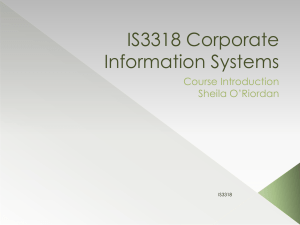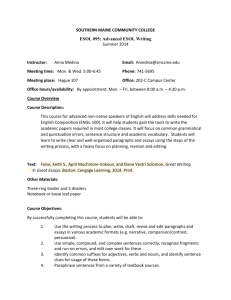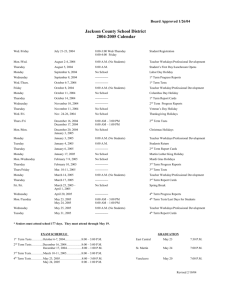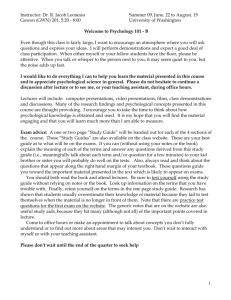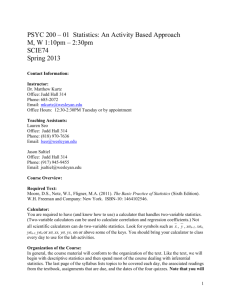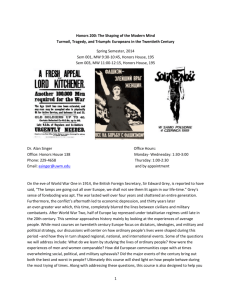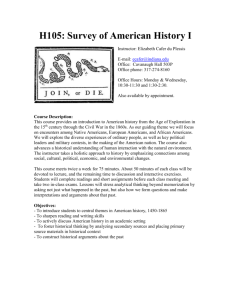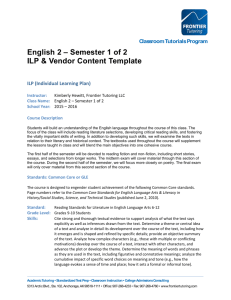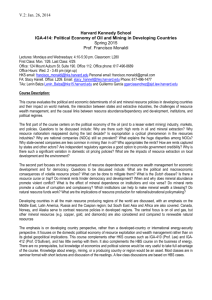ch595215Syl
advertisement
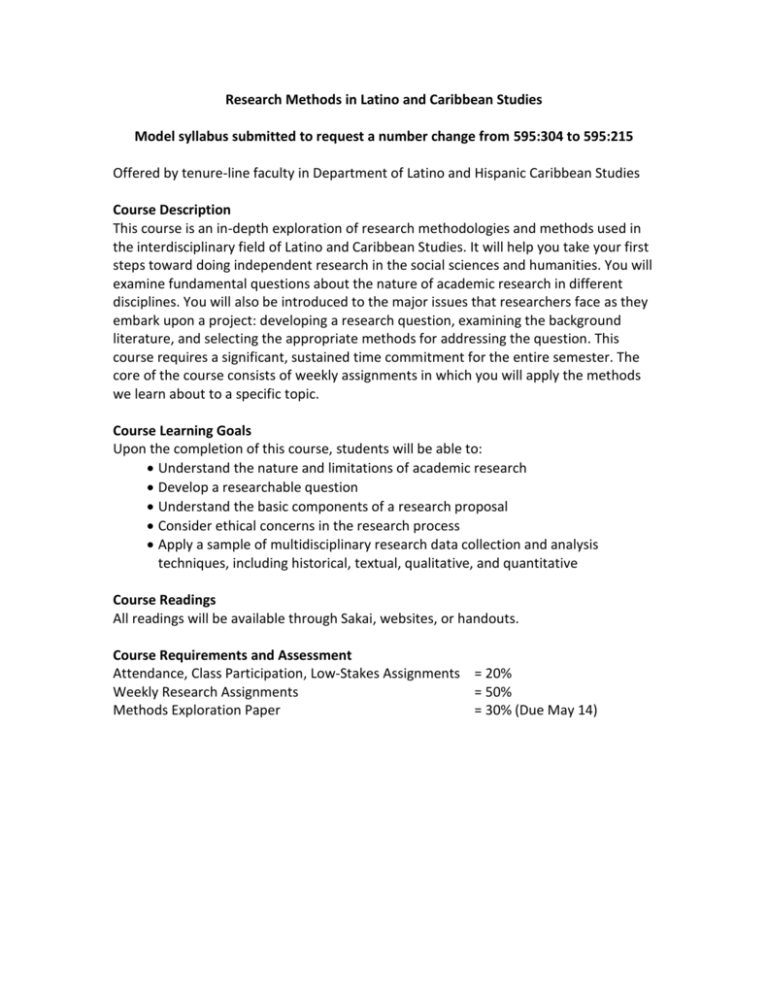
Research Methods in Latino and Caribbean Studies Model syllabus submitted to request a number change from 595:304 to 595:215 Offered by tenure-line faculty in Department of Latino and Hispanic Caribbean Studies Course Description This course is an in-depth exploration of research methodologies and methods used in the interdisciplinary field of Latino and Caribbean Studies. It will help you take your first steps toward doing independent research in the social sciences and humanities. You will examine fundamental questions about the nature of academic research in different disciplines. You will also be introduced to the major issues that researchers face as they embark upon a project: developing a research question, examining the background literature, and selecting the appropriate methods for addressing the question. This course requires a significant, sustained time commitment for the entire semester. The core of the course consists of weekly assignments in which you will apply the methods we learn about to a specific topic. Course Learning Goals Upon the completion of this course, students will be able to: Understand the nature and limitations of academic research Develop a researchable question Understand the basic components of a research proposal Consider ethical concerns in the research process Apply a sample of multidisciplinary research data collection and analysis techniques, including historical, textual, qualitative, and quantitative Course Readings All readings will be available through Sakai, websites, or handouts. Course Requirements and Assessment Attendance, Class Participation, Low-Stakes Assignments = 20% Weekly Research Assignments = 50% Methods Exploration Paper = 30% (Due May 14) Academic Integrity Policy Students are expected to abide by Rutgers University’s policy on academic integrity: http://academicintegrity.rutgers.edu/policy-on-academic-integrity Violations of the policy include: cheating, fabrication, plagiarism, denying others access to information or material, and facilitating violations of academic integrity. Self-Reporting Absence Students are expected to attend all classes; if you expect to miss one or two classes, please use the University absence reporting website to indicate the date and reason for your absence. An email is automatically sent to me. https://sims.rutgers.edu/ssra/ Please Note: Students with more than three unexcused absences are subject to having their final grade lowered. Students will not receive credit for late assignments. Course Schedule Wed. 1/23 INTRODUCTION TOPIC 1: METHODS AND METHODOLOGIES Mon. 1/28 What is research? What is methodology? Wed. 1/30 Reading: *Topic 1 Assignment/Discussion (Methodologies and Methods) Students’ Choice (bring in a book or article from an LHCS course) TOPIC 2: DESIGNING RESEARCH Mon. 2/4 Elements of a Research Proposal Wed. 2/6 Designing Research Questions Reading: John W. Creswell, Research Design: Qualitative, Quantitative, and Mixed Methods Approaches, Third Edition (Sage, 2009): Ch. 5 “The Introduction” and Ch. 6 “The Purpose Statement” Mon. 2/11 *Topic 2 Assignment/Discussion (Research Questions) TOPIC 3: HUMANITIES AND ETHNIC STUDIES Wed. 2/13 *Prof. Nelson Maldonado-Torres, LHCS and Comparative Literature *Topic 3 Assignment/Discussion (Reading Response) Reading: Frantz Fanon, Black Skin, White Masks (selection) 2 Gloria Anzaldúa, Borderlands/La Frontera (selection) TOPIC 4: BIBLIOGRAPHIC SOURCES Mon. 2/18 *Library Workshop: Melissa Gasparrotto, Librarian for African and Latin American Studies, Spanish and Portuguese Wed. 2/20 Bibliographic Sources Mon. 2/25 *Topic 4 Assignment/Discussion (100 and 30 References) TOPIC 5: RESEARCH ETHICS Wed. 2/27 Research Ethics / Institutional Review Board (IRB) Reading: W. Lawrence Neuman, Basics of Social Research: Qualitative and Quantitative Approaches, Second Edition (Pearson, 2007): Ch. 3 “Ethics in Social Research” Case Studies *Topic 5 Assignment Due Monday, March 3 (Human Subjects Certification) TOPIC 6: HISTORICAL METHODS Mon. 3/4 Reading: Historical Methods (Documentary and Archival) Lisa Yun, The Coolie Speaks: Chinese Indentured Laborers and African Slaves in Cuba (Temple University Press, 2008) Historical Documents Wed. 3/6 Reading: Historical Methods (Oral History) Oral History Association/Rutgers Oral History Project Guantánamo Public Memory Project: http://gitmomemory.org/stories/ Oral History Databases Mon. 3/11 *Topic 6 Assignment/Discussion (Historical Analysis) TOPIC 7: SOCIAL SCIENCE METHODS Wed. 3/13 *Prof. Zaire Dinzey-Flores, LHCS and Sociology (Overview) Reading: W. Lawrence Neuman, Social Research Methods: Qualitative and Quantitative Approaches, Third Edition (Allyn and Bacon): Ch. 1 “Science and Research” Dinzey-Flores, “Methodology,” Locked In, Locked Out: Gated 3 Communities in a Puerto Rican City (University of Pennsylvania Press, 2013) March 18-22 SPRING BREAK Mon. 3/25 7.1 Social Research Methods (Observation) Reading: Elisa Facio, Ch. 5 “Ethnography as Personal Experience,” in John H. Stanfield and Rutledge M. Dennis, eds., Race and Ethnicity in Research Methods (Sage, 1993) Wed. 3/27 7.2 Social Research Methods (Interviewing) Reading: James Spradley, “Asking Descriptive Questions,” in The Ethnographic Interview (1979) Mon. 4/1 *Topic 7.1 Assignment/Discussion (Observation) Wed. 4/3 Quantitative Methods and Census Data (Overview) Reading: Hortensia Amaro and Ruben E. Zambrana, “Criollo, Mestizo, Mulato, LatiNegro, Indigena, White, or Black? The US Hispanic/Latino Population and Multiple Responses in the 2000 Census,” American Journal of Public Health 90.11 (2000): 1724-27 Mon. 4/8 *Topic 7.2 Assignment/Discussion (Interviewing) Wed. 4/10 7.3 Social Research Methods (Content Analysis) Reading: Zaire Zenit Dinzey-Flores, “De la disco al caserío: Urban Spatial Aesthetics and Policy to the Beat of Reggaetón,” Centro Journal 20.2 (2008): 35-69 “Conducting Primary Research” (Analysis) (OWL) Mon. 4/15 *Topic 7.3 Assignment/Discussion (Content Analysis) TOPIC 8: GENDER AND SEXUALITY STUDIES Wed. 4/17 *Prof. Marcia Ochoa, Feminist Studies, University of California-Santa Cruz *Topic 8 Assignment/Discussion (Reading Response) Reading: Marcia Ochoa, Ch. 15 “Latina/o Transpopulations,” in Marysol Asencio, ed., Latina/o Sexualities: Probing Powers, Passions, Practices, and Policies (Rutgers University Press, 2010) 4 Marcia Ochoa, Ch. 2, “Becoming a Man in Yndias: The Meditations of Catalina de Erauso, The Lieutenant Nun,” in Nancy Raquel Mirabal and Agustin Laó-Montes, Technofuturos: Critical Interventions in Latina/o Studies (Lexington Books, 2007) TOPIC 9: LITERARY ANALYSIS Mon. 4/22 Literary Analysis *Topic 9 In-Class Assignment *TOPICS AND SOURCES FOR METHODS EXPLORATION PAPER DUE TOPIC 10: VISUAL ANALYSIS Wed. 4/24 Visual Analysis *Topic 10 In-Class Assignment Mon. 4/29 Individual Meetings Wed. 5/1 Peer Review/Workshop Mon. 5/6 Peer Review/Workshop *Tues. 5/14 METHODS EXPLORATION PAPER DUE (SAKAI) 5





